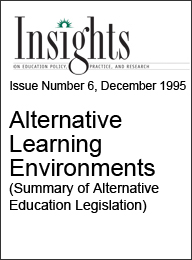Mandates: Policy Considerations
Research on alternative education clearly indicates that underlying goals and assumptions affect program design and success. Understanding the connections among goals, implementation, and outcomes for students will help policymakers decide whether to invest in alternative education and, if so, what types of programs may best achieve their specific goals. If policymakers decide to encourage or mandate alternative education, they must continue to consider these connections as they revisit and revise policies over time. The findings from research and practice discussed in this review suggest several important implications for effective alternative education policy development.
Policies should encourage and support true alternative education, not alternative discipline. Furthermore, if districts create short-term programs, policymakers should ensure mechanisms to provide supports for students during transitions and to facilitate communication between base and alternative schools. If possible, states should encourage flexible programs that allow students to remain in the alternative environment or return to the base school, depending on their needs.
States should encourage and support local control. No single program will work for all students or districts. Districts need flexibility to design the program that will best serve parents, families, the community, and their student population. Schools also need the flexibility to respond to individual student needs. However, local control does not imply isolation. Rather, states and districts should provide support for alternative programs, including technical and fiscal support.
States that mandate programs should ensure access to resources needed to create effective programs. Many of the features associated with successful alternative education programs require special resources. Therefore, if states mandate programs, every district faces the challenge of allocating resources to create a successful program. If states cannot help districts access needed resources, either by providing new funds or by helping them to reallocate existing monies and resources, states may need to reconsider the mandate approach. Even if states do not mandate alternative education, they may still encourage programs through other policies.
Programs must be evaluated. Evaluating programs is necessary to achieve at least two important goals. First, alternative schools should be held to strict accountability measures. Freedom from constraints on curriculum, instruction, and management enables practitioners to create effective alternative environments. Assessing the outcomes of programs that result from this freedom allows policymakers to validate differing approaches, document results, and provide information administrators can use to make necessary adjustments. Accountability can also help boost base-school faculty and public confidence in these programs. Second, evaluation will inform future decision-making. If programs are encouraged through grants, they should be evaluated to ensure the continuation of successful programs in the future. If programs are mandated, they must be evaluated since there are little or no empirical data regarding the effectiveness of mandated programs. States that do mandate and evaluate programs need to interpret results according to the specific components and population of students in the programs.
Next Page: Considering Broader School Reform

